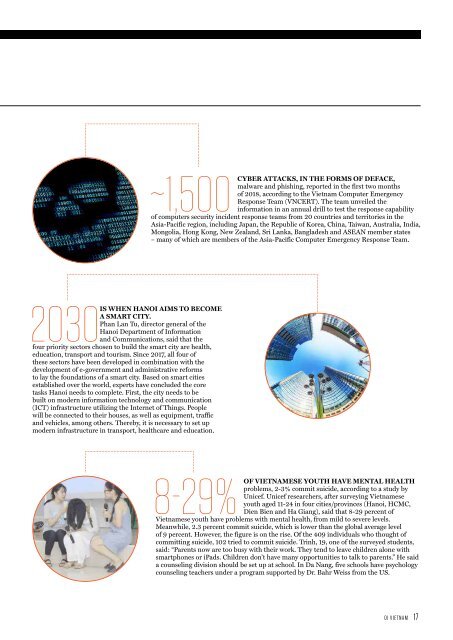Oi Magazine reviews - Aura & Co. Infrared Sauna Studio,Thao Dien... "Heavenly Heat"
Create successful ePaper yourself
Turn your PDF publications into a flip-book with our unique Google optimized e-Paper software.
~1,500<br />
CYBER ATTACKS, IN THE FORMS OF DEFACE,<br />
malware and phishing, reported in the first two months<br />
of 2018, according to the Vietnam <strong>Co</strong>mputer Emergency<br />
Response Team (VNCERT). The team unveiled the<br />
information in an annual drill to test the response capability<br />
of computers security incident response teams from 20 countries and territories in the<br />
Asia-Pacific region, including Japan, the Republic of Korea, China, Taiwan, Australia, India,<br />
Mongolia, Hong Kong, New Zealand, Sri Lanka, Bangladesh and ASEAN member states<br />
– many of which are members of the Asia-Pacific <strong>Co</strong>mputer Emergency Response Team.<br />
2030<br />
IS WHEN HANOI AIMS TO BECOME<br />
A SMART CITY.<br />
Phan Lan Tu, director general of the<br />
Hanoi Department of Information<br />
and <strong>Co</strong>mmunications, said that the<br />
four priority sectors chosen to build the smart city are health,<br />
education, transport and tourism. Since 2017, all four of<br />
these sectors have been developed in combination with the<br />
development of e-government and administrative reforms<br />
to lay the foundations of a smart city. Based on smart cities<br />
established over the world, experts have concluded the core<br />
tasks Hanoi needs to complete. First, the city needs to be<br />
built on modern information technology and communication<br />
(ICT) infrastructure utilizing the Internet of Things. People<br />
will be connected to their houses, as well as equipment, traffic<br />
and vehicles, among others. Thereby, it is necessary to set up<br />
modern infrastructure in transport, healthcare and education.<br />
8-29%<br />
OF<br />
Vietnamese youth have problems with mental health, from mild to severe levels.<br />
VIETNAMESE YOUTH HAVE MENTAL HEALTH<br />
problems, 2-3% commit suicide, according to a study by<br />
Unicef. Unicef researchers, after surveying Vietnamese<br />
youth aged 11-24 in four cities/provinces (Hanoi, HCMC,<br />
<strong>Dien</strong> Bien and Ha Giang), said that 8-29 percent of<br />
Meanwhile, 2.3 percent commit suicide, which is lower than the global average level<br />
of 9 percent. However, the figure is on the rise. Of the 409 individuals who thought of<br />
committing suicide, 102 tried to commit suicide. Trinh, 19, one of the surveyed students,<br />
said: “Parents now are too busy with their work. They tend to leave children alone with<br />
smartphones or iPads. Children don’t have many opportunities to talk to parents.” He said<br />
a counseling division should be set up at school. In Da Nang, five schools have psychology<br />
counseling teachers under a program supported by Dr. Bahr Weiss from the US.<br />
OI VIETNAM<br />
17





